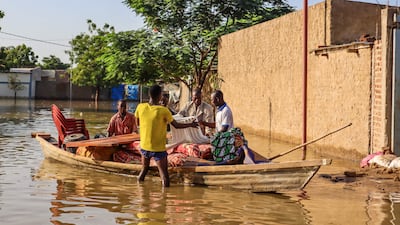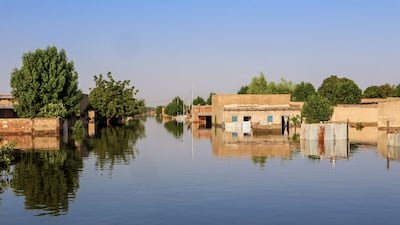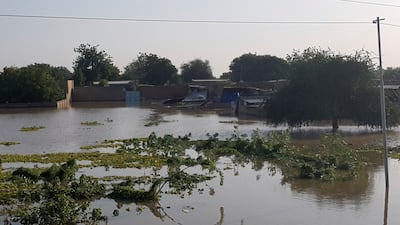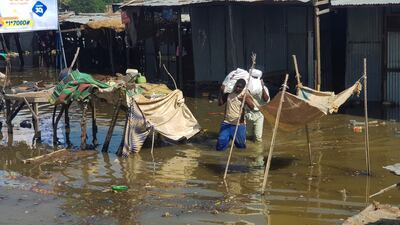Around 50 people have been killed in Chad, including "about 10" members of the security forces, as police and protesters clashed on Thursday, Prime Minister Saleh Kebzabo told a news conference on Thursday.
Violence broke out after demonstrators barricaded roads and torched the prime minister's party headquarters in capital N'Djamena as hundreds took to the streets to demand a quicker transition to democratic rule after President Mahamat Idriss Deby seized power last year.
A national unity government was formed on Friday to lead Chad for the next two years until elections. But critics are demanding a swifter return to democracy.
Police fired tear gas and rubber bullets to break up gatherings throughout the city.
The government said security forces acted only in self-defence.
"What happened today is an armed popular uprising to seize power by force and those responsible for this violence will face justice," said Kebzabo.
"The demonstrators had firearms and they are considered rebels."
Demonstrators demanding a quicker transition to democratic rule barricaded roads and torched the party headquarters of the new prime minister as hundreds took to the streets, Reuters reported.
"I firmly condemn the repression of demonstrations that led to deaths in Chad," African Union Commission Chairman Moussa Faki Mahamat, who is a former prime minister of Chad, wrote on Twitter.
The vast military-run Central African nation has been in crisis since the death of President Idriss Deby in April 2021, who ruled with an iron fist for three decades. Deby was killed while visiting troops fighting rebels.
There has been resistance to a transitional military council headed by Deby's son, Mahamat Idriss Deby Itno, who took power after the president's death and pushed back elections to October 2024.
Opposition and civil society groups called the protests on Thursday, which would have marked the end of an initially agreed 18-month transition period. The government banned them citing security reasons.
But demonstrators showed up early in the morning, using burning tyres and debris to block roads in the capital.
Police fired teargas and rubber bullets to break up gatherings throughout the city, killing at least three people and wounding several.
Heavy flooding
It comes after Chad declared a state of emergency as the country is hit with its worst flooding for three decades.
Heavy rains caused floods in 18 of the country's 23 provinces — displacing more than a million people, the president said on Wednesday.
The flooding destroyed thousands of hectares of crops and “swallowed up … 19,000 heads of livestock”, said Mr Deby. No deaths were reported.

Mr Deby said: “A state of emergency will be instituted to better contain and manage this natural disaster situation.
“The areas most at risk are the capital N'Djamena and surrounding areas.”
He called the situation “increasingly worrying”.
In N'Djamena, a field of tents has sprung up to provide emergency shelter and victims are striving to salvage what they can from the ruins of their homes, AFP reported on Wednesday.
In Walia, a poor neighbourhood to the south of the city, dozens of homes were ravaged last week after the Chari River burst its banks following torrential rain, the report said.
Water levels rose by up to five metres, which local officials said was unprecedented, and swept aside makeshift defences erected by desperate inhabitants.
Economic crisis
Chad is the world's third-poorest country, according to the UN's Human Development Index. The UN said 5.5 million citizens were in need of “emergency humanitarian aid”.
The country is facing a looming food crisis affecting more than two million people, the World Food Programme said.
Mr Deby said the nationwide state of emergency would help tackle the humanitarian situation in the worst-hit areas in the south, including N’Djamena.
The World Bank said 42 per cent of Chad's 16 million population live in poverty.
“We have to provide shelter, basic necessities and health protection,” Mr Deby said. “We have to thank the Almighty who has spared us the loss of life until now.”
He urged “friendly countries” and “technical and financial partners” to support the government's efforts.
The state of emergency comes as the landlocked oil producer’s military government faces growing discontent after extending by two years an 18-month deadline for a return to civilian rule.
The burning issue
The internal combustion engine is facing a watershed moment – major manufacturer Volvo is to stop producing petroleum-powered vehicles by 2021 and countries in Europe, including the UK, have vowed to ban their sale before 2040. The National takes a look at the story of one of the most successful technologies of the last 100 years and how it has impacted life in the UAE.
Read part three: the age of the electric vehicle begins
Read part two: how climate change drove the race for an alternative
Read part one: how cars came to the UAE
School uniforms report
The low down
Producers: Uniglobe Entertainment & Vision Films
Director: Namrata Singh Gujral
Cast: Rajkummar Rao, Nargis Fakhri, Bo Derek, Candy Clark
Rating: 2/5
On Women's Day
Dr Nawal Al-Hosany: Why more women should be on the frontlines of climate action
Shelina Janmohamed: Why shouldn't a spouse be compensated fairly for housework?
Samar Elmnhrawy: How companies in the Middle East can catch up on gender equality
The National Editorial: Is there much to celebrate on International Women's Day 2021?
The five pillars of Islam
1.
2.
3.
4.
5.
Whiile you're here
Damien McElroy: Anti-science attitudes in America are proving lethal
Editorial: What makes the UAE such a good place to test vaccines?
Editorial: The fight against Covid-19 should be guided by science
While you're here
The National editorial: Turkey's soft power weighs heavy on Europe's Muslims
Con Coughlin: How extremists use Zoom and other tools to exploit pandemic
Nicky Harley: Peace TV preacher Zakir Naik prompts UK hate laws review
The burning issue
The internal combustion engine is facing a watershed moment – major manufacturer Volvo is to stop producing petroleum-powered vehicles by 2021 and countries in Europe, including the UK, have vowed to ban their sale before 2040. The National takes a look at the story of one of the most successful technologies of the last 100 years and how it has impacted life in the UAE.
Read part four: an affection for classic cars lives on
Read part three: the age of the electric vehicle begins
Read part two: how climate change drove the race for an alternative
Key facilities
- Olympic-size swimming pool with a split bulkhead for multi-use configurations, including water polo and 50m/25m training lanes
- Premier League-standard football pitch
- 400m Olympic running track
- NBA-spec basketball court with auditorium
- 600-seat auditorium
- Spaces for historical and cultural exploration
- An elevated football field that doubles as a helipad
- Specialist robotics and science laboratories
- AR and VR-enabled learning centres
- Disruption Lab and Research Centre for developing entrepreneurial skills
Need to know
Unlike other mobile wallets and payment apps, a unique feature of eWallet is that there is no need to have a bank account, credit or debit card to do digital payments.
Customers only need a valid Emirates ID and a working UAE mobile number to register for eWallet account.
The rules of the road keeping cyclists safe
Cyclists must wear a helmet, arm and knee pads
Have a white front-light and a back red-light on their bike
They must place a number plate with reflective light to the back of the bike to alert road-users
Avoid carrying weights that could cause the bike to lose balance
They must cycle on designated lanes and areas and ride safe on pavements to avoid bumping into pedestrians
The specs
Engine: Dual 180kW and 300kW front and rear motors
Power: 480kW
Torque: 850Nm
Transmission: Single-speed automatic
Price: From Dh359,900 ($98,000)
On sale: Now
Kareem Shaheen on Canada
• Remittance charges will be tackled by blockchain
• UAE's monumental and risky Mars Mission to inspire future generations, says minister
• Could the UAE drive India's economy?
• News has a bright future and the UAE is at the heart of it
• Architecture is over - here's cybertecture
• The National announces Future of News journalism competition
• Round up: Experts share their visions of the world to come
War on waste
Tomorrow 2021
More from Neighbourhood Watch:
• Remittance charges will be tackled by blockchain
• UAE's monumental and risky Mars Mission to inspire future generations, says minister
• Could the UAE drive India's economy?
• News has a bright future and the UAE is at the heart of it
• Architecture is over - here's cybertecture
• The National announces Future of News journalism competition
• Round up: Experts share their visions of the world to come
Killing of Qassem Suleimani
Mina Al Oraibi: Air strike casts a long shadow over the decade ahead
Jack Moore: Why the assassination is such a monumental gamble
Matthew Levitt: Iran retains its ability to launch terror attacks
Damien McElroy: A CEO tasked with spreading Iran's influence
Hussein Ibish: Trump's order on solid constitutional ground
Simon Waldman: Cautious Israel keeping a low profile
Plastic tipping point
Plastic tipping points
Killing of Qassem Suleimani
National Editorial: Suleimani has been killed, now we must de-escalate
Mina Al Oraibi: Air strike casts a long shadow over the decade ahead
Jack Moore: Why the assassination is such a monumental gamble
Matthew Levitt: Iran retains its ability to launch terror attacks
Hussein Ibish: Trump's order on solid constitutional ground
Simon Waldman: Cautious Israel keeping a low profile
Tomorrow 2021
While you're here
Hussein Ibish: Could it be game over for Donald Trump?
Joyce Karam: Trump's campaign thrown off balance
Trump tests positive: everything we know so far
Abu Dhabi Sustainability Week
While you're here
Hussein Ibish: There are reasons for Democrats and Republicans to be happy
Rashmee Roshan Lall: Who are the women driving Joe Biden's success?
Company%20profile
Killing of Qassem Suleimani
National Editorial: Suleimani has been killed, now we must de-escalate
Mina Al Oraibi: Air strike casts a long shadow over the decade ahead
Jack Moore: Why the assassination is such a monumental gamble
Matthew Levitt: Iran retains its ability to launch terror attacks
Damien McElroy: A CEO tasked with spreading Iran's influence
Hussein Ibish: Trump's order on solid constitutional ground
Rashmee Roshan Lall: Sound of silence in South Asia
Can NRIs vote in the election?
Indians residing overseas cannot cast their ballot abroad
Non-resident Indians or NRIs can vote only by going to a polling booth in their home constituency
There are about 3.1 million NRIs living overseas
Indians have urged political parties to extend the right to vote to citizens residing overseas
A committee of the Election Commission of India approved of proxy voting for non-resident Indians
Proxy voting means that a person can authorise someone residing in the same polling booth area to cast a vote on his behalf.
This option is currently available for the armed forces, police and government officials posted outside India
A bill was passed in the lower house of India’s parliament or the Lok Sabha to extend proxy voting to non-resident Indians
However, this did not come before the upper house or Rajya Sabha and has lapsed
The issue of NRI voting draws a huge amount of interest in India and overseas
Over the past few months, Indians have received messages on mobile phones and on social media claiming that NRIs can cast their votes online
The Election Commission of India then clarified that NRIs could not vote online
The Election Commission lodged a complaint with the Delhi Police asking it to clamp down on the people spreading misinformation
While you're here
Gavin Esler: Britain seems to be moving ever closer to the brink
Hussein Ibish: George Floyd tragedy a turning point for the US
Shelina Janmohamed: Teach the history of the British Empire
Mohammed bin Zayed Majlis
On Women's Day
Dr Nawal Al-Hosany: Why more women should be on the frontlines of climate action
Shelina Janmohamed: Why shouldn't a spouse be compensated fairly for housework?
Samar Elmnhrawy: How companies in the Middle East can catch up on gender equality
Justin Thomas: Challenge the notion that 'men are from Mars, women are from Venus'
While you're here
Tomorrow 2021
Towering concerns
• Remittance charges will be tackled by blockchain
• UAE's monumental and risky Mars Mission to inspire future generations, says minister
• Could the UAE drive India's economy?
• News has a bright future and the UAE is at the heart of it
• Architecture is over - here's cybertecture
• The National announces Future of News journalism competition
• Round up: Experts share their visions of the world to come
Read more about the coronavirus
Tomorrow 2021
Transgender report
While you're here
Watch: Davos 2021 panel discusses the future of work for women
Alice Haine: Investing in gender parity 'makes good business sense'
Kareem Shaheen: How the pandemic could set Arab women back
Simon Rushton: Home schooling forces UK mothers to quit jobs
Our commentary on Brexit
- Con Coughlin: Choice of the British people will be vindicated
- Sam Williams: Departure is influenced by its sense of place
Mohammed bin Zayed Majlis
On Women's Day
Shelina Janmohamed: Why shouldn't a spouse be compensated fairly for housework?
Samar Elmnhrawy: How companies in the Middle East can catch up on gender equality
The National Editorial: Is there much to celebrate on International Women's Day 2021?
Justin Thomas: Challenge the notion that 'men are from Mars, women are from Venus'
Killing of Qassem Suleimani
National Editorial: Suleimani has been killed, now we must de-escalate
Mina Al Oraibi: Air strike casts a long shadow over the decade ahead
Matthew Levitt: Iran retains its ability to launch terror attacks
Damien McElroy: A CEO tasked with spreading Iran's influence
Hussein Ibish: Trump's order on solid constitutional ground
Simon Waldman: Cautious Israel keeping a low profile
More from Neighbourhood Watch
Neighbourhood Watch
The Florida Project
Director: Sean Baker
Starring: Bria Vinaite, Brooklynn Prince, Willem Dafoe
Four stars
More from Neighbourhood Watch:
While you're here
The specs
Engine: 2.0-litre 4cyl turbo
Power: 261hp at 5,500rpm
Torque: 405Nm at 1,750-3,500rpm
Transmission: 9-speed auto
Fuel consumption: 6.9L/100km
On sale: Now
Price: From Dh117,059
On Women's Day
Dr Nawal Al-Hosany: Why more women should be on the frontlines of climate action
Samar Elmnhrawy: How companies in the Middle East can catch up on gender equality
The National Editorial: Is there much to celebrate on International Women's Day 2021?
Justin Thomas: Challenge the notion that 'men are from Mars, women are from Venus'
Plastic tipping points
PULITZER PRIZE 2020 WINNERS
JOURNALISM
Public Service
Anchorage Daily News in collaboration with ProPublica
Breaking News Reporting
Staff of The Courier-Journal, Louisville, Ky.
Investigative Reporting
Brian M. Rosenthal of The New York Times
Explanatory Reporting
Staff of The Washington Post
Local Reporting
Staff of The Baltimore Sun
National Reporting
T. Christian Miller, Megan Rose and Robert Faturechi of ProPublica
and
Dominic Gates, Steve Miletich, Mike Baker and Lewis Kamb of The Seattle Times
International Reporting
Staff of The New York Times
Feature Writing
Ben Taub of The New Yorker
Commentary
Nikole Hannah-Jones of The New York Times
Criticism
Christopher Knight of the Los Angeles Times
Editorial Writing
Jeffery Gerritt of the Palestine (Tx.) Herald-Press
Editorial Cartooning
Barry Blitt, contributor, The New Yorker
Breaking News Photography
Photography Staff of Reuters
Feature Photography
Channi Anand, Mukhtar Khan and Dar Yasin of the Associated Press
Audio Reporting
Staff of This American Life with Molly O’Toole of the Los Angeles Times and Emily Green, freelancer, Vice News for “The Out Crowd”
LETTERS AND DRAMA
Fiction
"The Nickel Boys" by Colson Whitehead (Doubleday)
Drama
"A Strange Loop" by Michael R. Jackson
History
"Sweet Taste of Liberty: A True Story of Slavery and Restitution in America" by W. Caleb McDaniel (Oxford University Press)
Biography
"Sontag: Her Life and Work" by Benjamin Moser (Ecco/HarperCollins)
Poetry
"The Tradition" by Jericho Brown (Copper Canyon Press)
General Nonfiction
"The Undying: Pain, Vulnerability, Mortality, Medicine, Art, Time, Dreams, Data, Exhaustion, Cancer, and Care" by Anne Boyer (Farrar, Straus and Giroux)
and
"The End of the Myth: From the Frontier to the Border Wall in the Mind of America" by Greg Grandin (Metropolitan Books)
Music
"The Central Park Five" by Anthony Davis, premiered by Long Beach Opera on June 15, 2019
Special Citation
Ida B. Wells
On Women's Day
Dr Nawal Al-Hosany: Why more women should be on the frontlines of climate action
Shelina Janmohamed: Why shouldn't a spouse be compensated fairly for housework?
Justin Thomas: Challenge the notion that 'men are from Mars, women are from Venus'
The National Editorial: Is there much to celebrate on International Women's Day 2021?
More on Quran memorisation:
Tomorrow 2021
Killing of Qassem Suleimani
National Editorial: Suleimani has been killed, now we must de-escalate
Mina Al Oraibi: Air strike casts a long shadow over the decade ahead
Jack Moore: Why the assassination is such a monumental gamble
Damien McElroy: A CEO tasked with spreading Iran's influence
Hussein Ibish: Trump's order on solid constitutional ground
Simon Waldman: Cautious Israel keeping a low profile
How to avoid crypto fraud
- Use unique usernames and passwords while enabling multi-factor authentication.
- Use an offline private key, a physical device that requires manual activation, whenever you access your wallet.
- Avoid suspicious social media ads promoting fraudulent schemes.
- Only invest in crypto projects that you fully understand.
- Critically assess whether a project’s promises or returns seem too good to be true.
- Only use reputable platforms that have a track record of strong regulatory compliance.
- Store funds in hardware wallets as opposed to online exchanges.
While you're here
Aya Iskandarani: Why Hezbollah’s man in Iraq is now worth $10 million to the US
Khaled Yacoub Oweis: Hezbollah bids to control Lebanon’s financial system
National Editorial: Hezbollah's murky dealings in Iraq have been unveiled
Kareem Shaheen on Canada
India squads
Test squad against Afghanistan: Rahane (c), Dhawan, Vijay, Rahul, Pujara, Karun, Saha, Ashwin, Jadeja, Kuldeep, Umesh, Shami, Pandya, Ishant, Thakur.
T20 squad against Ireland and England: Kohli (c), Dhawan, Rohit, Rahul, Raina, Pandey, Dhoni, Karthik, Chahal, Kuldeep, Sundar, Bhuvneshwar, Bumrah, Pandya, Kaul, Umesh.
ODI squad against England: Kohli (c), Dhawan, Rohit, Rahul, Shreyas, Rayudu, Dhoni, Karthik, Chahal, Kuldeep, Sundar, Bhuvneshwar, Bumrah, Pandya, Kaul, Umesh
Our commentary on Brexit
- Alistair Burt: Despite Brexit, Britain can remain a world power
- Con Coughlin: Choice of the British people will be vindicated
The burning issue
The internal combustion engine is facing a watershed moment – major manufacturer Volvo is to stop producing petroleum-powered vehicles by 2021 and countries in Europe, including the UK, have vowed to ban their sale before 2040. The National takes a look at the story of one of the most successful technologies of the last 100 years and how it has impacted life in the UAE.
Read part four: an affection for classic cars lives on
Read part three: the age of the electric vehicle begins
Read part one: how cars came to the UAE
While you're here
Gavin Esler: Coronavirus offers stinging rebuke to protectionists
Kareem Shaheen: Pandemics can save us from waging wars
Sholto Byrnes: Why the climate change clash will get nastier
Benefits of first-time home buyers' scheme
- Priority access to new homes from participating developers
- Discounts on sales price of off-plan units
- Flexible payment plans from developers
- Mortgages with better interest rates, faster approval times and reduced fees
- DLD registration fee can be paid through banks or credit cards at zero interest rates
EA Sports FC 26
Publisher: EA Sports
Consoles: PC, PlayStation 4/5, Xbox Series X/S
Rating: 3/5
KILLING OF QASSEM SULEIMANI
National Editorial: Suleimani has been killed, now we must de-escalate
Mina Al Oraibi: Air strike casts a long shadow over the decade ahead
Jack Moore: Why the assassination is such a monumental gamble
Matthew Levitt: Iran retains its ability to launch terror attacks
Damien McElroy: A CEO tasked with spreading Iran's influence
Hussein Ibish: Trump's order on solid constitutional ground
Simon Waldman: Cautious Israel keeping a low profile
• Remittance charges will be tackled by blockchain
• UAE's monumental and risky Mars Mission to inspire future generations, says minister
• Could the UAE drive India's economy?
• News has a bright future and the UAE is at the heart of it
• Architecture is over - here's cybertecture
• The National announces Future of News journalism competition
• Round up: Experts share their visions of the world to come
What are the influencer academy modules?
- Mastery of audio-visual content creation.
- Cinematography, shots and movement.
- All aspects of post-production.
- Emerging technologies and VFX with AI and CGI.
- Understanding of marketing objectives and audience engagement.
- Tourism industry knowledge.
- Professional ethics.
While you're here
Gavin Esler: The Good Friday Agreement teaches us some important lessons
Damien McElroy: Boris must listen to Churchill's comments on Irish divisions
Janine di Giovanni: Track 2 diplomacy key to lasting peace in 21st century
Company profile
Name: Fruitful Day
Founders: Marie-Christine Luijckx, Lyla Dalal AlRawi, Lindsey Fournie
Based: Dubai, UAE
Founded: 2015
Number of employees: 30
Sector: F&B
Funding so far: Dh3 million
Future funding plans: None at present
Future markets: Saudi Arabia, potentially Kuwait and other GCC countries
Zayed Sustainability Prize
Transgender report
Confirmed%20bouts%20(more%20to%20be%20added)
MORE ON AFGHANISTAN
E-cigarettes report
The Brutalist
Director: Brady Corbet
Stars: Adrien Brody, Felicity Jones, Guy Pearce, Joe Alwyn
Rating: 3.5/5
THE BIO
Favourite author - Paulo Coelho
Favourite holiday destination - Cuba
New York Times or Jordan Times? NYT is a school and JT was my practice field
Role model - My Grandfather
Dream interviewee - Che Guevara
Director: Shady Ali
Cast: Boumi Fouad , Mohamed Tharout and Hisham Ismael
Rating: 3/5
More from Neighbourhood Watch:
Mohammed bin Zayed Majlis
• Remittance charges will be tackled by blockchain
• UAE's monumental and risky Mars Mission to inspire future generations, says minister
• Could the UAE drive India's economy?
• News has a bright future and the UAE is at the heart of it
• Architecture is over - here's cybertecture
• The National announces Future of News journalism competition
• Round up: Experts share their visions of the world to come
More from Neighbourhood Watch:
Ferrari 12Cilindri specs
Engine: naturally aspirated 6.5-liter V12
Power: 819hp
Torque: 678Nm at 7,250rpm
Price: From Dh1,700,000
Available: Now
Defence review at a glance
• Increase defence spending to 2.5% of GDP by 2027 but given “turbulent times it may be necessary to go faster”
• Prioritise a shift towards working with AI and autonomous systems
• Invest in the resilience of military space systems.
• Number of active reserves should be increased by 20%
• More F-35 fighter jets required in the next decade
• New “hybrid Navy” with AUKUS submarines and autonomous vessels
Specs
Killing of Qassem Suleimani
National Editorial: Suleimani has been killed, now we must de-escalate
Jack Moore: Why the assassination is such a monumental gamble
Matthew Levitt: Iran retains its ability to launch terror attacks
Damien McElroy: A CEO tasked with spreading Iran's influence
Hussein Ibish: Trump's order on solid constitutional ground
Simon Waldman: Cautious Israel keeping a low profile
While you're here
Gavin Esler: Will 2021 be Boris Johnson's worst year?
Thomas Harding: US relations with Europe could change
Brodie Owen: How England’s new lockdown rules work
World Mental Health Day
SERIES INFO
Afghanistan v Zimbabwe, Abu Dhabi Sunshine Series
All matches at the Zayed Cricket Stadium, Abu Dhabi
Test series
1st Test: Zimbabwe beat Afghanistan by 10 wickets
2nd Test: Wednesday, 10 March – Sunday, 14 March
Play starts at 9.30am
T20 series
1st T20I: Wednesday, 17 March
2nd T20I: Friday, 19 March
3rd T20I: Saturday, 20 March
TV
Supporters in the UAE can watch the matches on the Rabbithole channel on YouTube
While you're here
Con Coughlin: To survive, Nato must renew its sense of common purpose
Gavin Esler: Nato summit failed for making news more than it made deals
Simon Waldman: Nato continues to be Ankara’s best security guarantor











